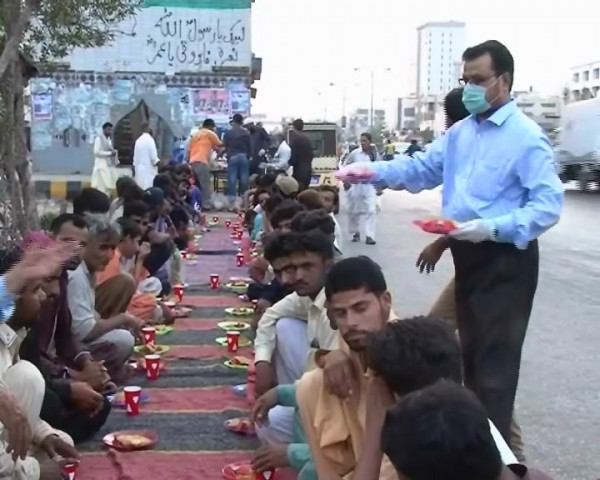Money may feed the body but the soul calls for care and attention
One of Karachi's more nurturing souls, this doctor believes public iftars can do more than feed the hungry

Feast-on-the-street: Dr B and his family organise iftars for over 500 people daily in DHA, Korangi Road and other surrounding areas. They ensure that the iftar they serve is healthy, hygienic and prepared in proper sanitary conditions. PHOTO: Express
One philanthropic soul, who contributes to the charitable spirit of Ramazan, and carries it forward for the rest of the year as well, is a doctor who hosts iftar on the streets every day. You'd be hard pressed to recognise him, however, as the doctor, henceforth referred to as Dr B, prefers to keep his identity hidden.
Karachi charity dishes out ostrich as Ramazan treat for poor
Doctor B
Dr B, a resident of Defence Housing Authority, hides behind a surgical mask while carrying out altruistic endeavors. He has served in an administrative capacity at government hospitals and medical complexes in Saudi Arabia and other gulf states and has been hosting public iftars on the streets of Karachi for many years. Each Ramazan, Dr B and his family organise iftars for over 500 people daily in DHA, Korangi Road and other surrounding areas.
What sets these iftars apart from others in the city is the added practice of cleanliness and hygiene - motivated by both Islamic teachings and his medical practice. Their benevolence is not restricted to money and food, Dr B and his son are involved in the entire process of organising the iftar - from buying fruit from the market, to monitoring its preparation, and then serving it to their guests on the streets. Dr B is also often joined by his friends and employees who volunteer their services readily.
A fruitful affair
The spirit of giving extends beyond monetary efforts. Charitable efforts continue all year long but what makes Ramazan unique and truly blessed is the love, care and concern for others which fills up the city and touches nearly all its residents.
"It is easy to act on principles of cleanliness and hygiene inside our own homes but it is often ignored when we arrange iftar and food drives on the roads," opines Dr B. There is a high risk of people being exposed to bacteria and germs if food is served in contaminated utensils and hands are not washed before eating.
Dr B, along with his son Afham, take painstaking efforts to ensure that the iftar they serve is healthy, hygienic and prepared in proper sanitary conditions.
"It is very important that dehydration and sufficient mineral intake is addressed when people break their fast. The use of clean and filtered water can prevent probable health issues," says Dr B.
The fruit served in the iftars hosted by them are bought by Dr B or his son. It is also cut and served under strict supervision by them. It is not just about ensuring good quality of the fruit, it is also necessary to tell people that wearing surgical gloves while cutting fruits is a healthy practice.
Dr B stresses that if fruit is touched while it is being cut, it may be exposed to germs and bacteria. For him, on-the-street-iftars are also an opportunity to raise awareness on healthy and hygienic habits. It serves both, those feasting and those engaged in altruistic efforts as cleanliness is intrinsic to our faith, he adds.
Sanitation on the streets
In the iftars hosted by Dr B's family, the spread of germs and bacteria is contained by wearing gloves. The cutlery is sterilised with hot water both before and after it is used while juices, drinks and mineral water are stored in clean buckets. Dr B supervises the purchase of all the food items and insists that mineral water be used while preparing the feast.
"We used to arrange iftars in mosques for many years but then we realised that hygiene was not always a priority there and for the past five years we have been organising iftars on the roads," says Afham.
Besides ensuring sanitation while preparing the food, the family is cognisant of the fact that roads and footpaths are not always cleaned after iftars and food drives. This can inconvenience pedestrians. Dr B and his volunteers spread out rugs and dastarkhwans before laying out the spread for iftar. All leftover food is collected and disposed of in a manner which minimises wastage and littering.
Collective effort
The family arranges food and rations for the underprivileged around the year and their efforts are spread across Sindh.
Dr B believes that relieving the country of its financial crisis is not just the government's responsibility but every Pakistani has to play their part. He stresses that people should pay their taxes with honesty and also help others in their own capacity.
According to Afham, welfare organisations in Pakistan work for the needy all year round but people need to approach these organisations themselves. Not everyone is comfortable reaching out and exposing their needs. Rising inflation has made quality food items less accessible for the less privileged and increased social responsibility on the more privileged elements of society. He opines that it is the responsibility of all privileged people that they find the people in need around them and provide not only food but assist in employment facilities, loans, and medical concerns as well.
Dr B hopes that if people contribute towards welfare efforts, the burden will be lifted off the government and it'll be able to spend more on development. Collective efforts can also ease the burden of inflation on those less privileged.


















COMMENTS
Comments are moderated and generally will be posted if they are on-topic and not abusive.
For more information, please see our Comments FAQ